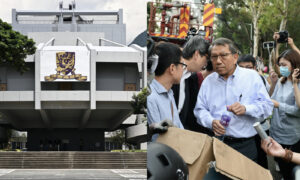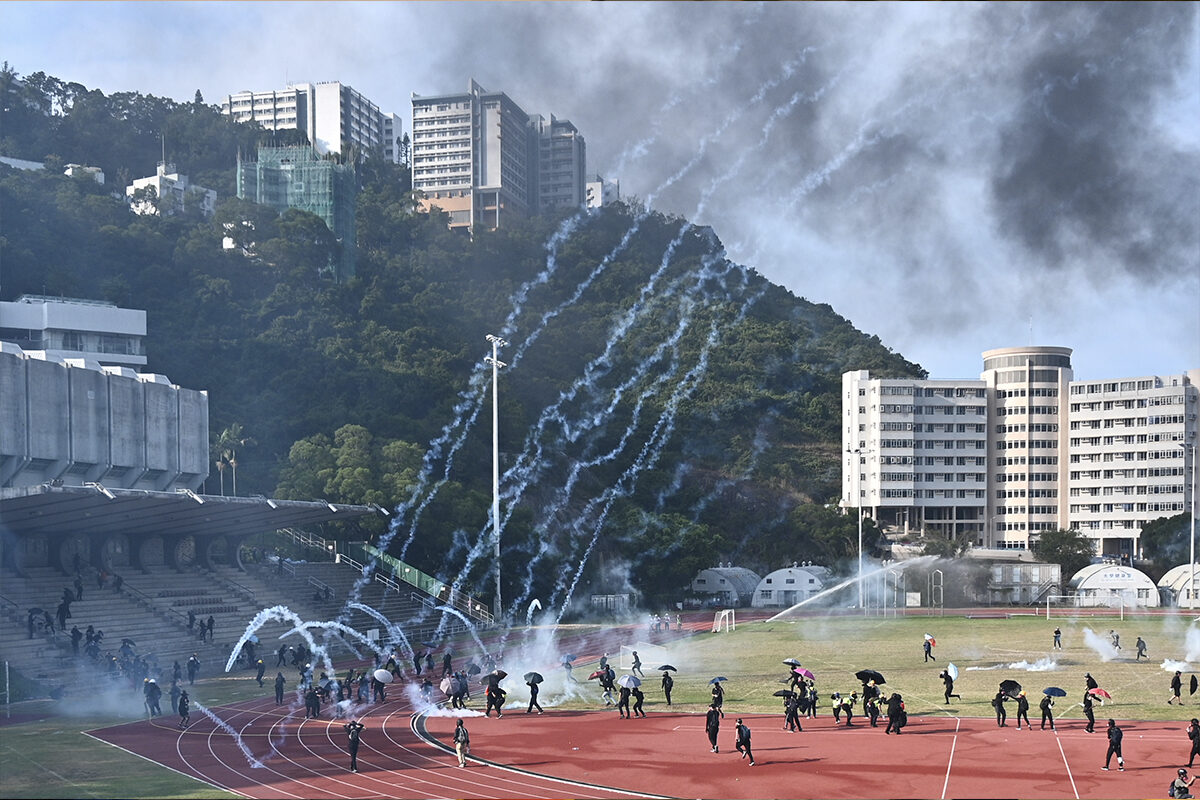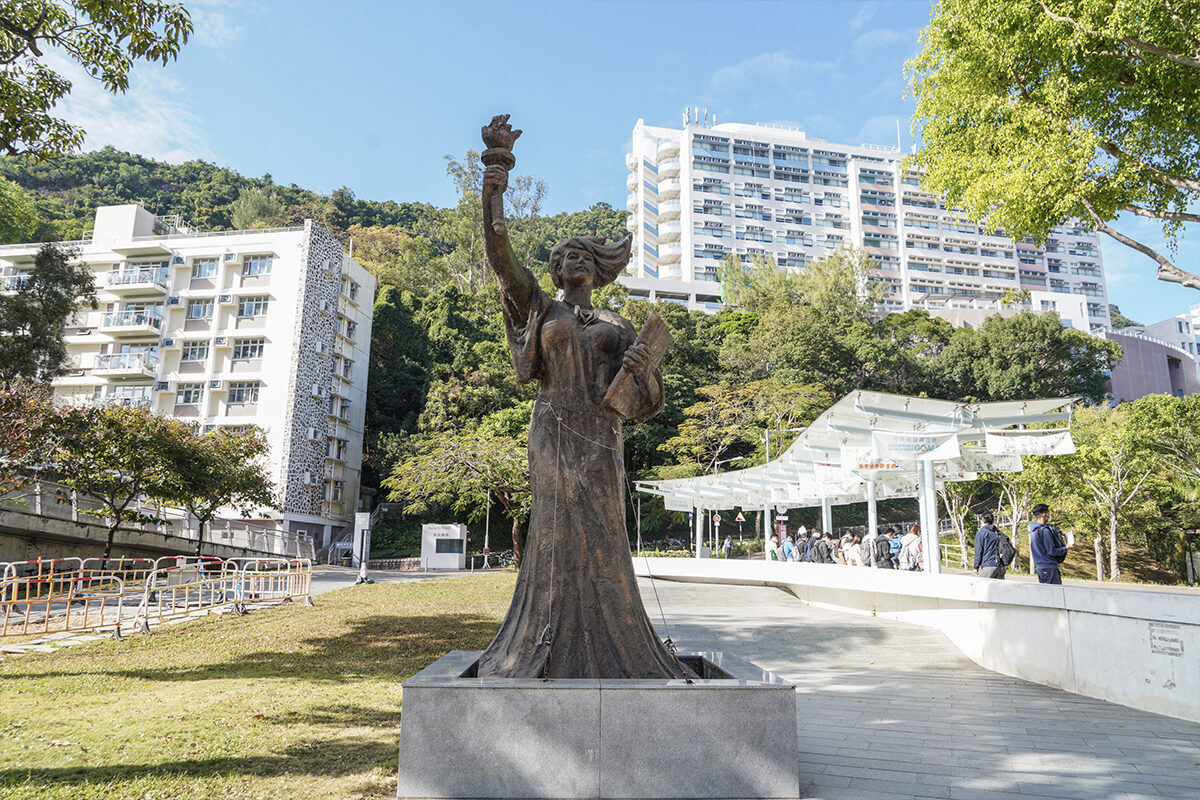University Vice Chancellor Under Attack From Pro-Communist Legco Members
Vice chancellor of CUHK, ranked 39th in the QS World University Rankings, accused of supporting students during the anti-extradition movementThe Chinese University of Hong Kong (CUHK) changed its emblem design in October, sparking opposition from all walks of life, and it was duly reverted to the previous version in just eight days. However, the CUHK turmoil has not yet ended. Pro-communist lawmakers took advantage of the incident to continue their verbal attacks against Rocky Tuan Sung-chi, the Vice Chancellor of CUHK, who had his contract renewed earlier. CUHK is Ranked as High as 39th in the Various Global University Indices of 2022 During the anti-extradition movement in 2019, there was a violent clash between the police and the public at CUHK. The police fired more than 2,000 tear gas canisters and rubber bullets on the campus within the three days of scuffles. Prof. Rocky Tuan Sung-chi, the then Vice Chancellor, once tried to mediate with the police and was almost hit. Since then, Tuan has been continuously accused of supporting the students. On Oct. 18, 2019, he sent an open letter after a dialogue with the students, stating that “for some police officers suspected of improper use of violence or violation of human rights, they must be condemned after verification.” Soon later, he was selected by Times Higher Education (THE) as one of the most influential figures in global higher education. The reporters in charge of the assessment mentioned that while all university leaders in Hong Kong had been involved in the anti-extradition turmoil, there were not many, like Tuan, who “came to the fore and expressed his firm support for his campus and the students.” Protesters react after police fired tear gas at the Chinese University of Hong Kong (CUHK) on Nov. 12, 2019. (Philip FONG/AFP) Contract Renewal by CUHK Led to Dissatisfaction from the Pro-Communist Camp On April 27 this year, Tuan was reappointed by the CUHK board for another 3 years, which immediately aroused dissatisfaction from the pro-communist camp. Leung Chun-ying, vice chairperson of the National Committee of the CCP’s rubber stamp legislature and former chief executive of Hong Kong, posted on his social networking sites that the decision to renew the contract “equals to the affirmation of Tuan’s performance during the anti-extradition campaign,” and described “Tuan’s issue as a serious political problem.” Leung also accused Tuan of “destroying CUHK.” Edward Lau Kwok-fan, a pro-establishment legislator who is also a board member of CUHK, said that Tuan’s stance while performing the duty of the university’s governance during the anti-extradition period “was not firm enough.” Tuan did, however, in June 2020 express his support for the “necessity of enacting a national security law,” and at the end of 2021, for allowing the removal of the statue of the Goddess of Democracy, which had been erected on the campus for more than 11 years. And again on Sept. 5, during the flag-raising ceremony on the new semester day of CUHK, he invited the Secretary for Security, the Secretary for Education, the Commissioner of Police, the Deputy Commissioner, the Deputy Director of the Liaison Office, Xu Kai, Director of the Liaison Bureau of the National Security Office, and Director of the International Department of the Office of the Commissioner of the Ministry of Foreign Affairs in Hong Kong. But all these remedial acts did not seem to satisfy the pro-communist camp, which is still chasing him ever since. The statue of the Goddess of Democracy, which had stood at CUHK for more than 11 years, was removed by the university at the end of 2021. (Adrian Yu/The Epoch Times) On Sept. 6, Leung Chun-ying published a number of posts criticizing Tuan’s speech at the opening ceremony, “making no mention of the country, nor the nation.” Apart from the words “rooted in China,” he did not tell the students about the relationship between CUHK and the country. There was also no demand for the students to “love the country and Hong Kong,” and did not ask the students to contribute to the country after they had achieved something in their studies. On these claims, he questioned why Tuan found it so difficult to talk about it openly. On this, Leung even compared Tuan’s speech with that of Prof. Tsui Lap-chee, former Vice Chancellor of the University of Hong Kong (HKU). New Emblem Controversy Provides Another Incident to Attack CUHK CUHK launched its new emblem design on Oct. 17, which aroused widespread criticism from the community, including thousands of teachers, students, and board members. A week later, on Oct. 25, CUHK announced its decision to halt the use of the controversial new emblem design. However, the whole saga once again triggered criticism from the pro-communist camp. At the Legislative Council meeting on Nov. 9, pro-communist legislator Priscilla Leung Mei-fun, of the Business and Professionals Alliance of HK questioned the Secretary for Education,

Vice chancellor of CUHK, ranked 39th in the QS World University Rankings, accused of supporting students during the anti-extradition movement
The Chinese University of Hong Kong (CUHK) changed its emblem design in October, sparking opposition from all walks of life, and it was duly reverted to the previous version in just eight days. However, the CUHK turmoil has not yet ended. Pro-communist lawmakers took advantage of the incident to continue their verbal attacks against Rocky Tuan Sung-chi, the Vice Chancellor of CUHK, who had his contract renewed earlier.
CUHK is Ranked as High as 39th in the Various Global University Indices of 2022
During the anti-extradition movement in 2019, there was a violent clash between the police and the public at CUHK. The police fired more than 2,000 tear gas canisters and rubber bullets on the campus within the three days of scuffles. Prof. Rocky Tuan Sung-chi, the then Vice Chancellor, once tried to mediate with the police and was almost hit.
Since then, Tuan has been continuously accused of supporting the students. On Oct. 18, 2019, he sent an open letter after a dialogue with the students, stating that “for some police officers suspected of improper use of violence or violation of human rights, they must be condemned after verification.”
Soon later, he was selected by Times Higher Education (THE) as one of the most influential figures in global higher education. The reporters in charge of the assessment mentioned that while all university leaders in Hong Kong had been involved in the anti-extradition turmoil, there were not many, like Tuan, who “came to the fore and expressed his firm support for his campus and the students.”

Contract Renewal by CUHK Led to Dissatisfaction from the Pro-Communist Camp
On April 27 this year, Tuan was reappointed by the CUHK board for another 3 years, which immediately aroused dissatisfaction from the pro-communist camp.
Leung Chun-ying, vice chairperson of the National Committee of the CCP’s rubber stamp legislature and former chief executive of Hong Kong, posted on his social networking sites that the decision to renew the contract “equals to the affirmation of Tuan’s performance during the anti-extradition campaign,” and described “Tuan’s issue as a serious political problem.” Leung also accused Tuan of “destroying CUHK.”
Edward Lau Kwok-fan, a pro-establishment legislator who is also a board member of CUHK, said that Tuan’s stance while performing the duty of the university’s governance during the anti-extradition period “was not firm enough.”
Tuan did, however, in June 2020 express his support for the “necessity of enacting a national security law,” and at the end of 2021, for allowing the removal of the statue of the Goddess of Democracy, which had been erected on the campus for more than 11 years. And again on Sept. 5, during the flag-raising ceremony on the new semester day of CUHK, he invited the Secretary for Security, the Secretary for Education, the Commissioner of Police, the Deputy Commissioner, the Deputy Director of the Liaison Office, Xu Kai, Director of the Liaison Bureau of the National Security Office, and Director of the International Department of the Office of the Commissioner of the Ministry of Foreign Affairs in Hong Kong. But all these remedial acts did not seem to satisfy the pro-communist camp, which is still chasing him ever since.

On Sept. 6, Leung Chun-ying published a number of posts criticizing Tuan’s speech at the opening ceremony, “making no mention of the country, nor the nation.” Apart from the words “rooted in China,” he did not tell the students about the relationship between CUHK and the country. There was also no demand for the students to “love the country and Hong Kong,” and did not ask the students to contribute to the country after they had achieved something in their studies. On these claims, he questioned why Tuan found it so difficult to talk about it openly. On this, Leung even compared Tuan’s speech with that of Prof. Tsui Lap-chee, former Vice Chancellor of the University of Hong Kong (HKU).
New Emblem Controversy Provides Another Incident to Attack CUHK
CUHK launched its new emblem design on Oct. 17, which aroused widespread criticism from the community, including thousands of teachers, students, and board members. A week later, on Oct. 25, CUHK announced its decision to halt the use of the controversial new emblem design. However, the whole saga once again triggered criticism from the pro-communist camp.
At the Legislative Council meeting on Nov. 9, pro-communist legislator Priscilla Leung Mei-fun, of the Business and Professionals Alliance of HK questioned the Secretary for Education, Christine Choi Yuk-lin, on the government’s ineffective supervision of CUHK and suggested the need to take the initiative to amend the “CUHK Governing Ordinance.”
Tommy Cheung Yu-yan, another pro-establishment Legco councillor, and also a board member of the CUHK, criticized the CUHK management’s disregard for the board. The decision to launch a new emblem solely at its own discretion reflects the governance problems of CUHK.
Joephy Chan Wing-yan of the Federation of Trade Unions claimed that the proportion of board members from the CUHK was too high, which led to Tuan’s re-appointment until 2027. She also criticized Tuan’s annual salary of $800,000 (HK$6.3 million) as too high. Other pro-communist members added their voices in criticizing Tuan’s re-appointment.
Former District Councillor: Pro-Establishment Figures Find New Targets to Prove Their Worth
Ben Lam Siu-pan, a former councillor of the Yau Tsim Mong district, who once served as the secretary of the CUHK Student Union, pointed out in an interview with The Epoch Times that Article 137 of the Basic Law stipulates that “all types of institutions may retain their autonomy and enjoy academic freedom.” Now we see Leung Chung-ying and a group of pro-establishment members criticizing Tuan for his speech and actions during the anti-extradition campaign and using his re-appointment as a further reason to attack him. This is an act of politically interfering in education, undermining the autonomy of institutions, and so are suspected of violating the Basic Law.
Lam lamented that both the CUHK, and Tuan, have been trying to appease the regime recently, but it still turned out to be of no avail, and indeed the pro-establishment camp has never stopped criticizing him. “When the democrats have disappeared, individual members of the pro-establishment camp need to find ways to prove their worth. No doubt they are looking for new targets to attack. In this way, even the pro-establishment groups that are not as sufficiently pro-Communist will be the first to be criticized.”
In 2019, when the anti-extradition movement started, CUHK ranked 49th in the QS World University Rankings and has risen steadily in the last three years to 39th place in 2022.












